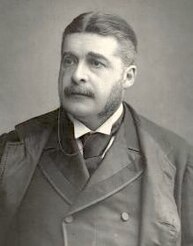
Back جيلبرت وسوليفان Arabic Gilbert y Sullivan AST Gilbert i Sullivan Catalan Gilbert a Sullivan Czech Gilbert og Sullivan Danish Gilbert und Sullivan German Gilbert y Sullivan Spanish Gilbert eta Sullivan Basque گیلبرت و سالیوان Persian Gilbert ja Sullivan Finnish
Gilbert and Sullivan refers to the Victorian-era theatrical partnership of the dramatist W. S. Gilbert (1836–1911) and the composer Arthur Sullivan (1842–1900) and to the works they jointly created. The two men collaborated on fourteen comic operas between 1871 and 1896, of which H.M.S. Pinafore, The Pirates of Penzance and The Mikado are among the best known.[1]
Gilbert, who wrote the libretti for these operas, created fanciful "topsy-turvy" worlds where each absurdity is taken to its logical conclusion: fairies rub elbows with British lords, flirting is a capital offence, gondoliers ascend to the monarchy, and pirates emerge as noblemen who have gone astray.[2] Sullivan, six years Gilbert's junior, composed the music, contributing memorable melodies[n 1] that could convey both humour and pathos.[n 2]
Their operas have enjoyed broad and enduring international success and are still performed frequently throughout the English-speaking world.[5][6] Gilbert and Sullivan introduced innovations in content and form that directly influenced the development of musical theatre through the 20th century.[7] The operas have also influenced political discourse, literature, film and television and have been widely parodied and pastiched by humorists. The producer Richard D'Oyly Carte brought Gilbert and Sullivan together and nurtured their collaboration. He built the Savoy Theatre in 1881 to present their joint works (which came to be known as the Savoy Operas) and founded the D'Oyly Carte Opera Company, which performed and promoted Gilbert and Sullivan's works for over a century.
- ^ Davis, Peter G. Smooth Sailing, New York magazine, 21 January 2002, accessed 6 November 2007
- ^ Leigh, Mike. "True anarchists", The Guardian, 4 November 2007, accessed 6 November 2007
- ^ "Arthur Sullivan 1842–1900, The Musical Times, vol. 41, no. 694, 1 December 1900, pp. 785–787
- ^ Mazzucato Gian Andrea. "Sir Arthur Sullivan: The National Composer", Musical Standard, vol. 12, no. 311, 30 December 1899, pp. 385–386
- ^ Bradley (2005), Chapter 1
- ^ Hewett, Ivan. "The Magic of Gilbert and Sullivan". The Telegraph, 2 August 2009, accessed 14 April 2010.
- ^ [Downs, Peter. "Actors Cast Away Cares", Hartford Courant, 18 October 2006
Cite error: There are <ref group=n> tags on this page, but the references will not show without a {{reflist|group=n}} template (see the help page).

